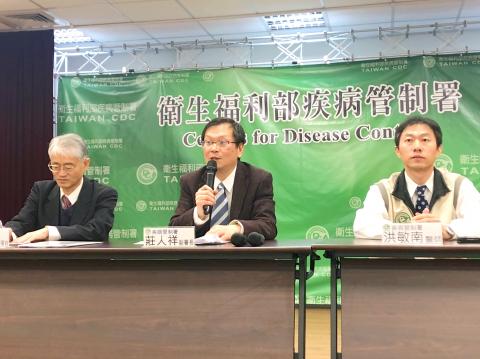The Centers for Disease Control (CDC) yesterday issued a level-2 travel alert for Wuhan, China, following a field survey in the city by two Taiwanese experts, as well as Japan and Thailand confirming cases linked to a pneumonia outbreak.
The cause of the outbreak has been identified as a new type of coronavirus, with Chinese authorities saying that as of Wednesday, 41 people had been infected, including six in critical condition and one fatality.
CDC Communicable Disease Control Medical Network commander Chuang Yin-ching (莊銀清) and epidemic prevention doctor Hung Min-nan (洪敏南), who conducted the survey in Wuhan from Monday to Wednesday, yesterday told a news conference in Taipei that 30 percent of the Wuhan patients had no direct exposure to the Huanan Seafood City market, the suspected epicenter of the outbreak.

Photo: Wu Liang-yi, Taipei Times
During clinical visits, they observed that patients who are obese or have previously undiagnosed illnesses seemed to be at higher risk of serious complications, Chuang said.
The CDC hopes to clarify whether human-to-human transmission is possible, Hung said, adding that “limited human-to-human transmission” was possibly identified during their visit.
Limited human-to-human transmission generally means that people within 1m of an infected person for about 10 minutes could contract a disease, meaning members of the same household or medical professionals treating infected patients are at higher risk, the CDC said.
In the cases of a married couple infected in Wuhan, the husband worked at the market, but the wife, who had not recently been to the market due to limited mobility, might have contracted the illness from her husband, Hung said.
Of the 41 cases in Wuhan, nearly 70 percent had direct exposure to the market, but 13 patients did not, meaning the source of the outbreak remains a mystery, he said.
Possible explanations provided by China include limited human-to-human transmission, a two-week latent period and an unknown source of infection, Hung said, adding that Chinese authorities have stepped up efforts to collect animal specimens for research.
Chinese authorities have prohibited people who have had close contact with patients from leaving Wuhan, hoping to curb the spread of the disease, Chuang said.
Taipei would not prohibit Taiwanese in Wuhan from returning to Taiwan, CDC Deputy Director-General Chuang Jen-hsiang (莊人祥) said, adding that people traveling to Wuhan should avoid traditional markets and hospitals, as well as contact with wild animals or livestock.
As the Lunar New Year is approaching, the agency said that it has intensified border inspections, while Premier Su Tseng-chang (蘇貞昌) said that as it is the high season for influenza, people should get vaccinated as early as possible.

ACTION PLAN: Taiwan would expand procurement from the US and encourage more companies to invest in the US to deepen bilateral cooperation, Lai said The government would not impose reciprocal tariffs in retaliation against US levies, President William Lai (賴清德) said yesterday, as he announced five strategies to address the issue, including pledging to increase Taiwanese companies’ investments in the US. Lai has in the past few days met with administrative and national security officials, as well as representatives from various industries, to explore countermeasures after US President Donald Trump on Wednesday last week announced a 32 percent duty on Taiwanese imports. In a video released yesterday evening, Lai said that Taiwan would not retaliate against the US with higher tariffs and Taiwanese companies’ commitments to

Intelligence agents have recorded 510,000 instances of “controversial information” being spread online by the Chinese Communist Party (CCP) so far this year, the National Security Bureau (NSB) said in a report yesterday, as it warned of artificial intelligence (AI) being employed to generate destabilizing misinformation. The bureau submitted a written report to the Legislative Yuan in preparation for National Security Bureau Director-General Tsai Ming-yen’s (蔡明彥) appearance before the Foreign Affairs and National Defense Committee today. The CCP has been using cognitive warfare to divide Taiwanese society by commenting on controversial issues such as Taiwan Semiconductor Manufacturing Co’s (TSMC, 台積電) investments in the

‘SPECIAL CHANNEL’: Taipei’s most important tasks are to stabilize industries affected by Trump’s trade tariffs and keep negotiations with Washington open, a source said National Security Council Secretary-General Joseph Wu (吳釗燮) arrived in the US for talks with US President Donald Trump’s administration, a source familiar with the matter said on Friday. Wu was leading a delegation for a meeting known as the “special channel,” the Financial Times reported earlier. It marked Trump’s first use of the channel since returning to the White House on Jan. 20. Citing a source familiar with the matter, the Financial Times reported that Minister of Foreign Affairs Lin Chia-lung (林佳龍) was also a part of the delegation. The visit came days after China concluded war games around Taiwan and amid Trump’s

HELPING HAND: The steering committee of the National Stabilization Fund is expected to hold a meeting to discuss how and when to utilize the fund to help buffer the sell-off The TAIEX plunged 2,065.87 points, or 9.7 percent, to close at 19,232.35 yesterday, the highest single-day percentage loss on record, as investors braced for US President Donald Trump’s tariffs after an extended holiday weekend. Amid the pessimistic atmosphere, 945 listed companies led by large-cap stocks — including Taiwan Semiconductor Manufacturing Co (TSMC, 台積電), Hon Hai Precision Industry Co (鴻海精密) and Largan Precision Co (大立光) — fell by the daily maximum of 10 percent at the close, Taiwan Stock Exchange data showed. The number of listed companies ending limit-down set a new record, the exchange said. The TAIEX plunged by daily maxiumu in just